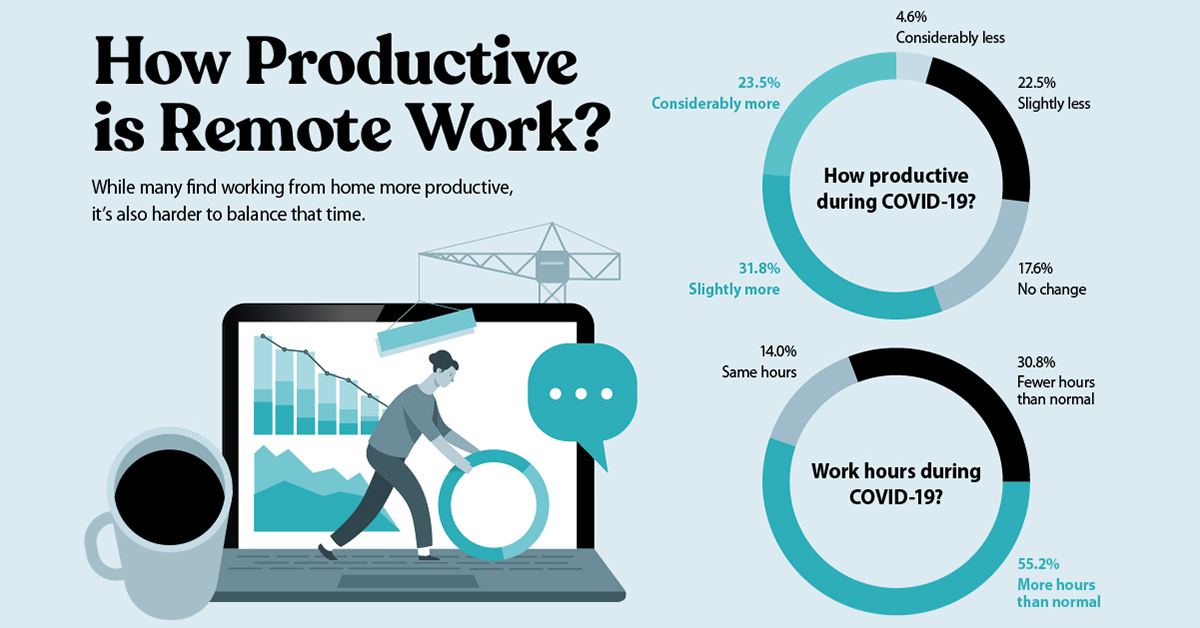Majority of remote workers are more productive and communicative Employee Experience. Also they can put more hours into work as compared to office going employees.
Busting Remote Myths Surrounding The Remote Working Set Up
Demonstrating trust in employees earning.

Productivity of remote workers. A report on remote work productivity during the pandemic found that productivity among employees working from home due to COVID-19 has dropped in what the report authors call a productivity tax. You can add more business-oriented measures like customer satisfaction level increase in sales or increase in website visitors to your productivity measure. While remote work is often associated with software development its not exclusive to engineers.
Not only do workers feel more productive but their employers also agree. Most leaders think remote working will hit productivity - this is why 42 of Americans aged 20-64 earning more than 20000 were working from home full-time. How to Track your Remote Workers Productivity Focus on Results and Not Hours Worked.
Happier workers are more likely to sustain higher levels of productivity. Value output over the work put in. Overall 77 of remote workers in that survey reported higher productivity.
A useful but often overlooked technique in measuring. Studies have shown that remote teams are 13 to 35 more productive. Create a policy for measuring work-from-home and remote employee productivity At the most basic level productivity is a measure of output per unit of time.
Knowledge silos are the nemesis of remote work. Many organisations are new to the remote work structure and have spent all their. In contrast 61 percent of the workforce in the United States can work no more than a few hours a week remotely or not at all.
You might not know this but remote workers actually have a productivity advantage. The productivity of remote workers has been in debate for longer than remote work became popular. The Social Security Administration has reduced their backlog 11 since they instituted remote.
The power of autonomy and remote work productivity In their 2019 State of Remote Work report OWL Labs surveyed 1202 full-time workers 62 of who work remotely at least in part. Remote workers have a greater sense of freedom and control which makes them happier. These arent extra perks they support remote employees basic needs to be productive Support for remote employees needs to be technological financial and.
To function at optimal performance remote workers need easy access to the information and resources they need to do their jobs. A centralized document repository with powerful search is a must for. People in other roles and industries can show high remote work productivity with a laptop and an Internet connection whatever the location.
What do remote workers want most from their employers. BBC For some working from home is distracting and draining. Another 22 say remote workers are equally as productive and only 3 say their workers are less productive at home.
The COVID-19 pandemic accelerated long. The remote work experiment that upped productivity 13. As mentioned above remote workers have flexibility and can work when they feel on top of their productivity level.
85 say that flexible remote policies have improved their overall productivity. Organizations that are new to the remote working scene would be used to seeing. But one pioneering study.
A critical approach to measuring the productivity of. In fact the phrase phoning it in is often used to accuse someone of an insincere or. 72 of companies with remote-work policies say they make workers more productive an Indeed blog post about the survey says.
Employees are more effective when they have some flexibility in their work arrangements. In addition to productivity companies have talked about remote works positive impact in areas like safety cost savings environmental impact emergency preparedness employee satisfaction and. 37 of remote workers say the best way to boost productivity is to take regular breaks 30 of telecommuters save upward of 5000 a year 11000 is how much companies can save annually for each employee that works remotely half-time People who work remotely earn 4000 more per year on.
In the US workforce we find that just 22 percent of employees can work remotely between three and five days a week without affecting productivity while only 5 percent could do so in India. How do I measure my remote workers productivity.
